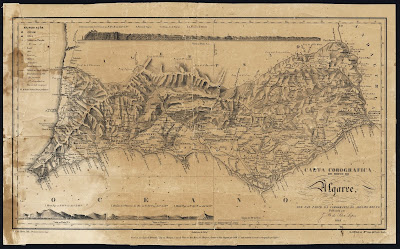 February 16, 2017 saw the 750th anniversary of the 1267 Treaty of Badajoz, signed by Afonso III of Portugal and Alfonso X of Castile and Léon. This treaty is commonly given as the date at which the Algarve became indisputably Portuguese, writes Peter Booker of the Algarve History Association.*
February 16, 2017 saw the 750th anniversary of the 1267 Treaty of Badajoz, signed by Afonso III of Portugal and Alfonso X of Castile and Léon. This treaty is commonly given as the date at which the Algarve became indisputably Portuguese, writes Peter Booker of the Algarve History Association.*
But why was it necessary to have a treaty with Castile over the status of the Algarve? And was it the final step in consolidating the border between Portugal and Spain?
As the Christian kingdoms of northern Iberia conducted the reconquest of the south in the thirteenth century, many of the advances were made by the Orders of Knights. At this time, the knights owed their allegiance not to any king, but to the pope. D Paio Peres Correia of the Knights of Santiago pressing further down the Guadiana, occupied Mértola in 1239 and Cacela and Ayamonte in 1240. The territory thus controlled by the Santiago Knights ranged from Mértola to both banks of the mouth of the Guadiana.
Silves and the rest of the Algarve was cut off from Muslim reinforcement from the rest of Andalusia. Turning westwards, D Paio eventually masterminded the capture of Tavira in 1242 and Silves soon after and Afonso III (1248 – 1279), the new king of Portugal, was on hand to oversee the submission of Faro in 1249.
But there was a problem. The Muslim lord of Niebla and the Algarve, Ibn Mahfud, had recently submitted for protection to the Infante Alfonso of Castile and Léon, and Alfonso was now his overlord. According to the practices of the time, this submission gave the Castilian king the right to what is now the Portuguese Algarve. And in fact, Alfonso X the Wise (1252 – 1284) continued to use the title King of the Algarve long after he had ceded the territory to the king of Portugal.
As soon as Alfonso X came to the throne, war broke out between Castile and Portugal. Pope Innocent IV succeeded in negotiating a peace treaty between these Christian powers, the terms of which were: Afonso III of Portugal would marry Alfonso´s illegitimate daughter Beatriz (in spite of the fact that he was already married); and he renounced his rights over the Algarve in favour of his father-in-law.
Alfonso X became vassal of Afonso III, and continued to hold the Algarve and the territories to the east of the Guadiana. This situation would continue until the first born boy of the marriage achieved the age of seven. In 1263, when the boy (the future D Dinis of Portugal 1279 – 1325) was two, however, the two monarchs had agreed that he should become Lord of the Algarve, and the arrangement was made permanent as both monarchs signed the Treaty of Badajoz on 16 February, 1267.
War broke out again in 1295 as Portugal and Aragon intervened in a Castilian civil war. In effect, the Dowager Queen of Castile, María de Molina bought off the interfering Portuguese by conceding territory. At the Treaty of Alcañices 1297, Portugal gained Campo Maior, Ouguela and Olivença in the Alentejo; and territory between the rivers Coa and Águeda in Beira Alta (including the fortresses of Almeida, Castelo Bom, Castelo Melhor, Castelo Rodrigo, Monforte, Sabugal, Sastres and Vilar Maior); and São Félix dos Galegos.
Serpa and Moura on the eastern bank of the Guadiana had become a part of Castile for a brief period (1271 – 1283) but their position as Portuguese territory was consolidated at Alcañices. With the exception of Olivença and other minor modifications, the frontier agreed at Alcañices continues in use to this day.
When Catholic Europe changed its calendar from the Julian to the Gregorian in February, 1582 they immediately lost ten days. And so the actual anniversary of the signing of this treaty is on 26 February, not the 16th.

* The Algarve History Association aims to promote interest in Portuguese culture and history using the English language as the main medium but with an increasing number of articles in Portuguese. The organisation is non-profit making and undertaken on a voluntary basis. The Association charges no membership fee, and there is no charge to attend presentations unless there is a need to cover expenses of visiting lecturers.
Click on: Algarve History Association






















